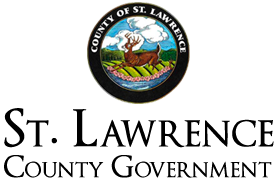Press Release
Date: July 2022 Contact: Jenesse Watson
FOR IMMEDIATE RELEASE 315-386-2325
The St. Lawrence County Public Health Department Reports First Raccoon to Test Positive for Rabies in 2022.
The St. Lawrence County Public Health Department urges residents to take precautions as the first confirmed case of rabies in a raccoon has been reported in our County this year. Routine surveillance by the USDA (U.S Department of Agriculture) led to the detection of a rabid raccoon in the town of Norfolk. The raccoon was found dead on the side of the road and was submitted to the New York State Department of Health Laboratory for testing as a part of the routine surveillance that is done by the USDA.
What is Rabies?
Rabies is a deadly virus that can be spread to people from the saliva of infected animals. Rabies is usually spread through an animal bite, but can also be spread through a scratch. In St. Lawrence County, the animals most likely to spread rabies are raccoons, skunks, bats and foxes. Domestic animals, such as cats and dogs, may spread the virus if they come in contact with an infected wild animal.
What is St. Lawrence County Publi c Health’s Role in Rabies Prevention?
When an animal bite is reported to Public Health, staff interview those involved to gather the information about the incident. If it is a bite from a cat or dog, Public Health contacts the owner of the pet and asks the owner to confine the animal for a period of time to make sure the pet is not showing any signs of rabies. If the bite is from a wild animal and the animal was captured, the animal would be submitted for rabies testing. If the animal (domestic or wild) cannot be confined or tested, Public Health will determine if rabies post-exposure treatment is necessary for the person who was exposed.
When are Animals Submitted for Rabies Testing?
The USDA does routine surveillance testing of animals, such as foxes, raccoons and skunks. Abnormal or suspicious acting wildlife can also be submitted for testing by the USDA. The USDA urges the community to report any abnormal or suspicious acting animals. Animals are submitted for testing if there is a chance that a person or pet has had contact (such as a scratch or bite) as they may have been exposed to rabies.
USDA Oral Rabies Vaccine Efforts in New York State
The USDA distributes an oral rabies vaccine (ORV) bait annually in Northern New York State. These ORV baits are coated in a fishmeal attractant which draws wildlife to the rabies vaccine bait. The baits are distributed in targeted areas and work to reduce the spread of rabies. These bait drops have proven to be successful in reducing the number of animals testing positive for rabies in St. Lawrence County and surrounding jurisdictions.
Protect your Family and Pets against Rabies
- Keep pets and livestock up to date with rabies vaccinations, supervise pets while they are outside and feed them inside.
- Do not feed, touch or adopt wild animals, stray dogs or cats.
- Do not attract wild animals to your home or yard. Tightly lock garbage and compost bins, and store bird seed and pet food inside. If you do have a wild animal living around your home, call an animal control officer to remove the animal for a fee.
- Report any strange or abnormal acting wildlife to the USDA. Wild animals may be submitted for rabies testing if they have had contact with humans, pets or if they display unusual behavior.
- Those who have been exposed to the saliva or brain tissue of a suspected rabid animal should wash all wounds, seek medical attention immediately and report any animal bites or rabies exposures to St. Lawrence County Public Health (315) 386-2325.
- If you suspect your pet or livestock has made contact with the saliva or brain tissue of a rabid animal contact your veterinarian for medical care and contact St. Lawrence County Public Health to determine what steps must be taken next.
- Report all animal bites or contact with wild animals to Public Health. Try not to let the animal involved escape.
For any additional questions regarding rabies, please call the St. Lawrence County Public Health Department at (315) 386-2325 or visit https://stlawco.org/Departments/PublicHealth/RabiesControl.
###
